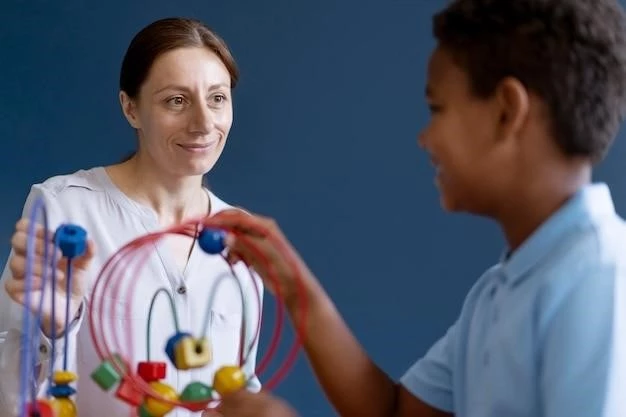Disease ⏤ Fazio-Londe Syndrome

Introduction to Fazio-Londe Syndrome
Fazio-Londe Syndrome is a rare genetic disorder characterized by progressive degeneration of the spinal cord’s motor neurons. This neurological condition leads to muscle weakness and paralysis, ultimately resulting in respiratory failure. Individuals with Fazio-Londe Syndrome experience a range of symptoms, including difficulty speaking, swallowing, and breathing. The syndrome is caused by a genetic mutation that affects the function of motor neurons in the spinal cord.
First identified in the late 20th century٫ Fazio-Londe Syndrome presents challenges in diagnosis and management due to its rarity and complexity. The disorder’s degenerative nature poses significant disability for affected individuals٫ impacting their quality of life. While there is ongoing research into potential therapeutic approaches٫ the incurable nature of the disease underscores the urgent need for increased understanding and support for those living with Fazio-Londe Syndrome.
Understanding the Genetic Basis
The genetic basis of Fazio-Londe Syndrome lies in a mutation affecting the function of specific genes responsible for motor neuron development and maintenance. This rare neurological disorder is inherited in an autosomal recessive pattern, meaning that an individual must inherit two copies of the mutated gene – one from each parent – to develop the condition.
Researchers have identified mutations in genes such as SLC52A2 and SLC52A3 as contributing factors to Fazio-Londe Syndrome. These genes play a crucial role in the transport of riboflavin (Vitamin B2) into cells, which is essential for the proper functioning of motor neurons. Disruption of this process can lead to the degeneration of motor neurons in the spinal cord, resulting in the characteristic symptoms of muscle weakness and paralysis seen in individuals with Fazio-Londe Syndrome.
Understanding the genetic basis of the syndrome is essential not only for accurate diagnosis but also for guiding potential therapeutic approaches; As advancements in genetic research continue, there is hope for improved management and intervention strategies for individuals affected by Fazio-Londe Syndrome.
Symptoms and Progression
Fazio-Londe Syndrome manifests with a spectrum of symptoms that progress over time. Common early signs include muscle weakness in the face and throat, leading to difficulties in speaking and swallowing. As the disorder advances, individuals may experience increasing weakness in the limbs, eventually resulting in paralysis.
Progression of Fazio-Londe Syndrome is characterized by the gradual degeneration of motor neurons in the spinal cord. This degenerative process leads to a decline in motor function, impacting mobility and coordination. In severe cases, respiratory muscles can also be affected, culminating in respiratory failure.
Individuals with Fazio-Londe Syndrome may also exhibit muscle wasting (atrophy) and contractures due to prolonged muscle weakness. The progression of the disease varies from person to person, with some experiencing a more rapid decline in motor function than others. Regular monitoring and symptom management are crucial in addressing the evolving challenges presented by Fazio-Londe Syndrome.
Neurological Implications
The neurological implications of Fazio-Londe Syndrome primarily stem from the progressive degeneration of motor neurons in the spinal cord. Motor neurons are essential for transmitting signals from the brain to muscles throughout the body, controlling voluntary movements. In individuals with this syndrome, the loss of motor neurons results in muscle weakness and impaired motor function.
As Fazio-Londe Syndrome advances, the neurological consequences become more pronounced, leading to difficulties in motor coordination, balance, and fine motor skills. The degenerative nature of the disorder affects the communication between the brain and muscles, causing gradual paralysis that can significantly impact daily activities.
Neurologically, individuals with Fazio-Londe Syndrome may also experience challenges in motor planning and execution, affecting tasks such as walking, reaching, and gripping objects. The neurological implications extend beyond motor function, impacting overall quality of life and independence. Understanding these implications is crucial in developing personalized care plans and interventions to support individuals living with Fazio-Londe Syndrome.
Respiratory Complications and Risk of Respiratory Failure
Individuals with Fazio-Londe Syndrome face significant respiratory complications due to the progressive nature of the condition. As the degeneration of motor neurons in the spinal cord continues, respiratory muscles may become weakened, compromising the ability to breathe effectively. This weakening of the respiratory muscles can predispose individuals to respiratory infections and, in severe cases, respiratory failure.
The risk of respiratory failure in Fazio-Londe Syndrome is a critical concern, as it can lead to life-threatening consequences if not managed promptly and effectively. Respiratory failure occurs when the respiratory muscles are no longer able to support adequate breathing function, resulting in a lack of oxygen reaching the body’s tissues.
Monitoring respiratory function and implementing appropriate interventions, such as respiratory support devices or assisted ventilation, are essential in mitigating the risk of respiratory failure in individuals with Fazio-Londe Syndrome. Early detection of respiratory complications and proactive respiratory management are key considerations in the comprehensive care of individuals affected by this rare neurodegenerative disorder.
Diagnosis and Management
Diagnosing Fazio-Londe Syndrome involves a comprehensive evaluation of symptoms, genetic testing, and neurological examinations. Given the rarity of the disorder, healthcare providers may need to consider a range of differential diagnoses before confirming the presence of this specific condition. Genetic testing plays a crucial role in identifying the underlying genetic mutation responsible for the syndrome.
Once diagnosed, the management of Fazio-Londe Syndrome focuses on addressing symptoms, maintaining quality of life, and providing supportive care tailored to the individual’s needs. Physical therapy and rehabilitation programs can help manage muscle weakness and improve mobility. Speech and swallow therapy may be necessary to address difficulties in communication and swallowing.
Regular monitoring of respiratory function is essential to detect and manage respiratory complications early. Individuals with Fazio-Londe Syndrome may benefit from multidisciplinary care involving neurologists, pulmonologists, rehabilitation specialists, and other healthcare professionals to ensure a comprehensive approach to symptom management and support.
Current Research and Therapeutic Approaches
Current research on Fazio-Londe Syndrome focuses on understanding the genetic mechanisms underlying the condition and exploring potential therapeutic interventions to address its debilitating effects. Scientists are investigating novel treatment strategies aimed at targeting the genetic mutations associated with the syndrome, with the goal of slowing disease progression and improving outcomes for affected individuals.
Therapeutic approaches for Fazio-Londe Syndrome may include gene therapy, enzyme replacement therapy, or other innovative treatments designed to restore motor neuron function and alleviate symptoms. Researchers are also exploring the use of stem cell therapies and neuroprotective agents to preserve neuronal health and function in individuals with the syndrome.
Clinical trials and collaborative research efforts are fundamental in advancing our knowledge of Fazio-Londe Syndrome and developing effective treatment modalities. By staying at the forefront of scientific progress and innovation, healthcare professionals and researchers aim to provide hope for individuals living with this rare neurodegenerative disorder.
Living with Fazio-Londe Syndrome
Living with Fazio-Londe Syndrome presents significant challenges for individuals and their families due to the progressive nature of the disease and its impact on daily functioning. Coping with muscle weakness, paralysis, and respiratory difficulties requires a multidisciplinary approach to care that addresses both physical and emotional well-being.
Adapting to the evolving symptoms of Fazio-Londe Syndrome may involve making lifestyle modifications, utilizing assistive devices for mobility and communication, and accessing support services to enhance quality of life. Emotional support and counseling play a crucial role in helping individuals and families navigate the psychosocial aspects of living with a rare neurodegenerative disorder.
Education and advocacy efforts are essential in raising awareness about Fazio-Londe Syndrome within the community and ensuring access to specialized care and resources for those affected by the condition. By fostering a supportive environment and promoting inclusivity, individuals living with Fazio-Londe Syndrome can lead meaningful and fulfilling lives despite the challenges posed by the disorder.
The Incurable Nature of the Disease
Fazio-Londe Syndrome is an incurable genetic disorder characterized by progressive degeneration of motor neurons in the spinal cord. As of now, there are no known curative treatments or interventions that can reverse the underlying genetic mutation or halt the disease’s progression. This poses significant challenges for individuals diagnosed with the syndrome and underscores the importance of symptom management and supportive care.
The incurable nature of Fazio-Londe Syndrome necessitates a focus on enhancing quality of life, optimizing symptom control, and providing comprehensive care to address the complex needs of affected individuals. Healthcare professionals, caregivers, and support networks play a pivotal role in ensuring that those with the syndrome receive the necessary physical, emotional, and psychosocial support to navigate the challenges associated with the condition.
While the lack of a cure may present obstacles, ongoing research into potential therapeutic approaches offers hope for advancements in the management of Fazio-Londe Syndrome. By advocating for continued research efforts and supporting individuals living with this rare neurodegenerative disorder, the healthcare community strives to improve outcomes and maintain the dignity and well-being of those affected by the incurable nature of the disease.
Conclusion
In conclusion, Fazio-Londe Syndrome is a rare genetic disorder characterized by progressive degeneration of motor neurons in the spinal cord, leading to muscle weakness, paralysis, and respiratory complications. The incurable nature of the disease underscores the importance of symptom management, supportive care, and ongoing research into potential therapeutic approaches.
Individuals living with Fazio-Londe Syndrome face significant challenges in daily functioning, requiring a comprehensive approach to care that addresses physical, emotional, and psychosocial needs. Despite the lack of a cure, advancements in research offer hope for improved outcomes and enhanced quality of life for those affected by this rare neurodegenerative disorder.
By raising awareness, advocating for specialized care, and promoting inclusivity and support within the community, we can empower individuals with Fazio-Londe Syndrome to lead fulfilling lives and navigate the complexities of the condition with dignity and resilience. Collaborative efforts in research and healthcare are essential in advancing our understanding of the disease and enhancing the lives of individuals affected by Fazio-Londe Syndrome.
